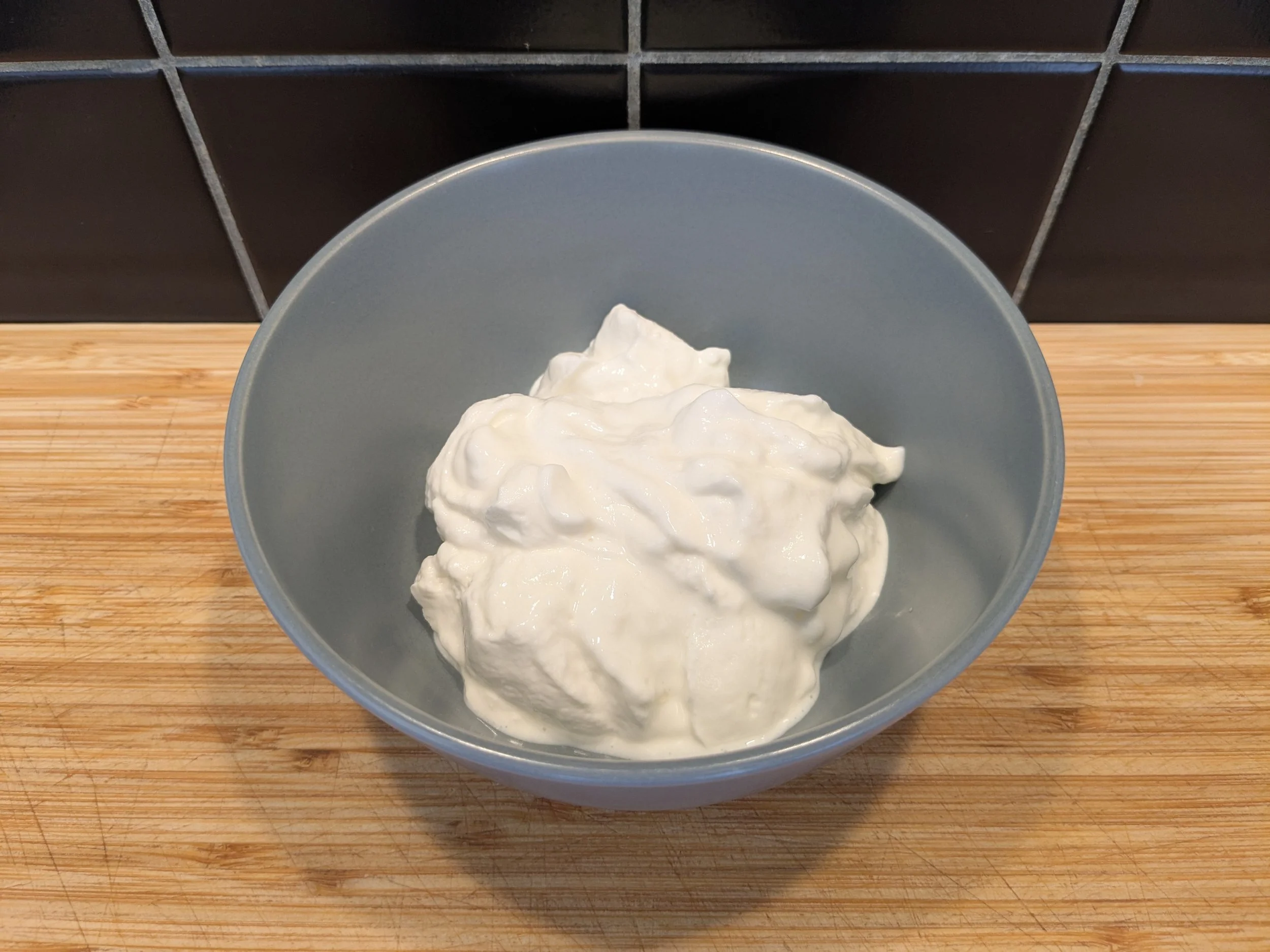Yoguri plain high protein yoghurt review
Here we will give a hands-on, taste-tested review of Yoguri plain high protein yoghurt. We’ll look into the benefits, ingredients, nutrition and flavour of this Aldi own-brand yoghurt.
This yoghurt is available in Aldi stores in Australia.
It is also made in Australia.
Ingredients of Yoguri plain high protein yoghurt
This is the simplest yoghurt we have reviewed so far - it only contains skim milk and live cultures.
So it doesn’t contain any additives like thickeners, sweeteners or flavourings. And unlike some other yoghurts (usually on the cheaper end), it doesn’t contain milk powders.
It’s looking good so far!
Benefits of Yoguri plain high protein yoghurt
This yoghurt comes with the usual health benefits you would expect from a plain yoghurt, as well as having great protein and fat levels.
For context, we’ll compare a few key factors against Woolworths high protein plain yoghurt and Chobani Greek yoghurt which are two other high-protein yoghurts.
Live cultures
There is no indication of the specific live cultures included so we don’t know whether they are probiotic or not (which means they have been proven to provide health benefits).
For comparison, Woolworths has at least four strains of live cultures and Chobani has five.
In terms of the amount of actual live cultures present (ie colony forming units), none of these three yoghurts give any information on this.
Read more about the benefits of probiotic foods.
Postbiotics
Postbiotics are essentially things cultures produce during fermentation. These include healthy short-chain fatty acids which nourish our gut lining and may help reduce symptoms of irritable bowel syndrome.
Other health measures
Fat: This yoghurt has extremely low fat levels at 0.1%. Woolworths is also very low at less than 1%, whereas Chobani has 4%. For further context, other brands which don’t focus on protein often have around 9% fat (eg Tamar Valley Greek style yoghurt).
Protein: Its protein content is also very good at 9.1% - which is just lower than Woolworths (9.4%) and higher than Chobani (8.6%).
Calcium: Curiously Yoguri gives no information on its calcium content. This is the first yoghurt we have tested which fails to provide this information.
Appearance
As the picture below shows, it maintains its shape in the bowl fairly well, but does sink to the bottom a lit bit.
Texture
Similar to Woolworths high protein plain yoghurt, it has a thick texture, but not in a nice creamy way. This is of course due to the near absence of fat.
Flavour
The aroma is subtle with some savoury cheese notes.
Again, similar to the Woolworths high protein yoghurt, the taste is seriously lacking. There’s just not much going on. The texture suggests that it’s going to be lovely and luxurious, but it is not. There’s some savoury cheese taste and a low acidity. Afterwards a bland chalky cheesy taste lingers in your mouth.
Overall, the taste is very unsatisfying - but not offensive.
All this shouldn’t be surprising though as fat is an important aspect of flavour in yoghurt ¯\_(ツ)_/¯
Use
I wouldn’t suggest using this yoghurt on its own as you will likely not find it very enjoyable.
However, it can work very well in a smoothie where the taste isn’t so prominent.
Cost of Yoguri plain high protein yoghurt
You can buy a 900g tub from Aldi for $6 - which is the same size and price of Woolworths high protein plain yoghurt.
Summary
3.5 stars out of 5.
A very simple yoghurt with great protein and fat levels, but this comes at the expense of taste.
Pros
very high in protein
extremely low in fat
Cons
unsatisfying taste
doesn’t have a creamy texture
no information on calcium content
no information on the strains of live cultures included
needs more information on the actual amount of live cultures it contains (ie colony forming units)
Health benefits of yoghurt
Aside from the specific benefits listed above, especially related to probiotics and postbiotics, yoghurt has some other important health benefits.
Vitamins and minerals
Yoghurt is a source of various vitamins and minerals including:
calcium - which helps digestion and supports bone and teeth health
magnesium - which supports bone health, muscle function and energy production
phosphorus - which is important for bone and teeth health and energy metabolism
potassium - which supports heart, muscle, nerve and kidney health
vitamins B2 and B12 - which support immunity, energy production and cell and nerve function
vitamin A - supports vision, immune function, cell growth and healthy skin
Satiety and weight management
The high protein and low carbohydrate content in yogurt, especially Greek style yogurt, helps you feel fuller for longer which can help control your appetite. Greek yoghurt is often recommended by dietitians for this reason.
Reduced lactose
Compared to unfermented dairy products such as milk, yoghurt has lower levels of lactose as this is partially consumed by bacteria during the fermentation process. This makes it more digestible for people who have some degree of lactose intolerance.
Your reviewer
This article was reviewed by Travis, the founder of this website, long-time gut enthusiast and passionate kombucha maker!








